Sorted by date Results 151 - 175 of 191

I intentionally put a question mark behind my title “Cover Crops” for this article because I think they have raised more questions than any production practice I’ve seen in farming. I don’t think there is any doubt the production of cover crops can improve the soil. The big question is how to implement them profitably into a cropping system. In Furrow magazine recently published an article titled “Cover Crops Face Off With Fallow”. The article looks at some claims that cover crops save more m...

Mid July and the temperatures are climbing. The farmers are climbing into their harvesters. And the drought and poor ratings are climbing higher than a feather in a wind storm. According to Farm Journal’s Ag Web, in Nebraska, as of last Thursday, 1,300 acres had been harvested compared to 1,160 a year ago at this time, yielding 35.0 bushels per acre, compared to 43.0 bushels per acre in 2013. The first of June, farmers were yielding 41.0 bushels per acre. Colorado harvested 2,170 acres c...

The Panhandle No-till Partnership recently hosted field days at numerous farms across the Panhandle. I would like to thank the Nebraska Environmental Trust and the Nebraska No-till Cadre for providing financial support for these field days. I would also like to thank Curt Roth, Art Olsen, Pat and Mark Ernest, Stetson Shreve, and Steve Tucker for allowing us to tour their farms. I’m very impressed with the quality of work the no-till crop producers are doing across the Panhandle. There are s...

Our way of life in agriculture across the breadbasket of America is being threatened by special interest groups who disagree with how we conduct our business. These special interest groups disagree with how we produce the food which feeds the world. Our image as stewards of the land and livestock is being tainted and it’s important we start telling our side of the story. These special interest groups are well organized and well funded. Their sole intention is to dictate policy so the food we pro...

The first thing I want to tell you about soil microbe testing is that this type of testing is in its infancy. Dr. Ray Ward, founder of Ward Laboratories in Kearney, has just begun to explore this type of soil testing. It’s safe to say that Ray will be learning along with the producers who send in samples for this type of soil health testing. Approximately one month ago I sent Dr. Ward soil samples from a neighbor’s winter wheat/summer fallow cropping rotation, our continuous no-till dry lan...

Stateline Producers recently hosted a two day field pea tour around the Panhandle. I joined the group to see how this year’s crop looked and to learn more about field pea production. The producer’s around the Panhandle have done an excellent job of planting, inoculating, and weed control in this year’s crop. They have done everything they can to insure a profitable crop provided Mother Nature cooperates. Byron Lemmoyne, director of Pulse USA from Bismark, North Dakota, and Brad Karlen, a field...

Mountain Pine Beetle, Pine Bark Beetle, Black Hills Beetle, Rocky Mountain Pine Beetle… and sometimes described by other, more colorful explicative terms, are all the same little guy… Dendroctonus ponderosae, He is less than 3/16 of an inch long, like a small black grain of rice…a little bit bigger than a piece of broken lead from your pencil…yet he can cause unimaginable damage. . He is here and the game is on. The score, so far, is not so good - 3.6 million acres to the credit of the Bark Be...
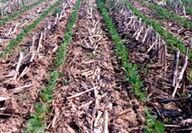
Last week I was invited to the Nebraska Ag Educators meeting in Kearney, Neb. I was invited to speak about the water conservation benefits of no-till crop production. The meeting consisted of around 200 of Nebraska’s high school agricultural education teachers and speakers invited to address the group about the many physical, chemical, and biological components that make up our soils. Dr. Ray Ward of Ward Laboratories was also invited to speak at the meeting. I had supper with Ray the night befo...
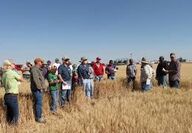
The Panhandle No-till Partnership will be hosting a series of field days on June 24 thru June 27. These field days will be held at various locations throughout the Panhandle of Nebraska. These field days will focus on the benefits of continuous no-till crop production on dry land farms. Topics of discussion will cover all aspects of continuous no-till crop production in our region. Each field day will provide producers with the opportunity to visit with other producers about the benefits of...

The Nebraska No-till Cadre has put together an outstanding educational opportunity for producers in Nebraska. This educational event is a bus tour departing from Kearney, Neb., on June 24, and will return to Kearney on June 27. This bus tour is partially funded through the Nebraska Environmental Trust and UNL Extension. A registration fee of $200 is required for each Nebraska participant. The registration is $400 for out of state participants. Registration includes the bus tour, hotels, and...
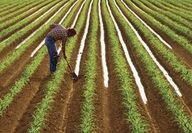
The weather in our region is always full of surprises and this spring has certainly been a dramatic turnaround from the drought conditions we were experiencing. These extremes in temperature and moisture from year to year really present a challenge for our agricultural producers in this region. This spring has been the complete opposite of what we experienced last year. I have visited with producers the last couple of days from around the Panhandle and the moisture received from this last storm...
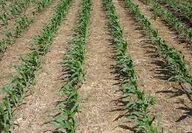
No one really knows how far this Brown Revolution can take modern agriculture in this soil health initiative. The last time our soils were really in top soil health was before the prairies were turned into farm land. Through the development of agriculture the soil’s health has declined mostly due to tillage and the removal of plants growing in the soil throughout the growing season. With the introduction of no till crop production, the elimination of tillage, use of cover and forage crops, a...
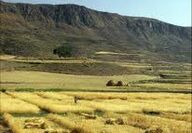
I really think we can improve the profitability of our farming operation by improving the soil health on our farm. Last week I talked about our first real experiment with improving soil health. We planted a forage mix of field peas, flax, sunflower, and radishes following last year’s winter wheat harvest on our irrigated field. A neighbor put his livestock on these acres and grazed this mix this March. We will plant corn into this forage residue. We were careful not to overgraze the forage m...

The “Brown Revolution” is a term given to the emphasis that is now being placed on improving the soil’s health on the farms and ranches across our country. Agriculture went through the “Green Revolution” years ago which helped shape modern day agriculture. During the “Green Revolution” commercial fertilizers were developed and crop varieties were developed through plant breeding to site-specific growing regions. Herbicides to control specific weeds were developed. These technologies...

It’s sure been an ugly April and that is exactly what we needed. The majority of us have experienced several days of snow, wintery mix, spring showers, and back to blowing snow. April has been above normal in precipitation and it couldn’t have come at a better time. With this moisture has come an optimism that the drought may be easing and we’ll have a chance at producing good crops and hay this growing season. All we need now is for Mother Nature not to forget about us and give us “norm...
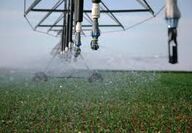
Thankfully we finally received a blanket of wet snow across our growing region. There is also more snow in the forecast which should help us to recover from the prolonged drought we’ve experienced since last growing season. This welcome moisture will begin to add to our soil moisture profile for the upcoming growing season. The past couple of weeks I’ve shown that no-till crop production on our irrigated acres has many benefits. Economic analysis of no-till crop production has shown no-till to... Full story

Stacey Lynn Gray and Brooks Allan Hoffman, along with their parents have announced their engagement. She is the daughter of Van and Jan Gray of Burns. He is the son of Gary and Jeanne Hoffman of Chadron, Neb. A June wedding is planned. The bride-to-be earned a Bachelor of Arts in elementary education from the University of Wyoming and a Master of Education in curriculum and instruction in reading from Grand Canyon University. She teaches kindergarten at Freedom Elementary School for Laramie...
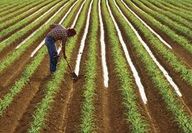
Jessica Johnson, UNL agricultural educator at the Panhandle Research and Extension Center located in Scottsbluff has compiled budgets for the majority of the irrigated crops commonly grown here in our region. I’d like to take a look at these budgets that compare strip till, conventional tillage, and no-till crop production systems. Jessica’s budgets assume equal use of irrigation in producing these crops. When you compare these budgets you also need to factor in that the no-till crop pro...

No-till crop production has proven to be the best production system for conserving moisture. Leaving the previous crop’s residues on the soil surface and attached has improved water infiltration into the soil and reduced soil moisture evaporation. Numerous research projects have shown the moisture conservation that no-till crop production provides under irrigation. The University of Nebraska has conducted research at the North Platte research farm which has shown that leaving residues on the s...

Last week I looked at some of the budgets Jessica Johnson, Ag Educator with the UNL Panhandle Resource and Extension Center, put together for winter wheat production on dry land acres for the Panhandle. Jessica’s budgets were for conventional winter wheat/summer fallow, winter wheat/chemical fallow, and winter wheat grown in a continuous no till crop rotation. These budgets indicate a yield of 28.01 bushels/acre is required to cover all costs associated with winter wheat production grown in a co...

Jessica Johnson, University of Nebraska Extension Educator at the Panhandle Research and Extension Center, has been busy this winter working on crop budgets. Jessica has developed budgets for dry land as well as irrigated crops using different crop production systems. For the dry land crops she developed budgets for winter wheat using conventional tillage, no-till summer fallow, and no-till continuous cropping systems. She also developed budgets for dry land corn, field peas, sunflowers, and...

I’m sitting in a hotel room in Pierre, S.D., waiting for the brakes to get fixed on our recently purchased semi-tractor. We have a full load of field pea seed sitting on the trailer in tote bags. Our situation has got me to thinking about everything involved in the process of providing a consistent and healthy food supply to our consumers. With more and more field pea acres being planted in our region, we decided getting all the seed from South Dakota to our region was going to require some r...
Over the past few articles I’ve written about how we developed a no-till cropping system for our farm. After a few years of using no till on our dry land acres, we adopted our irrigated acres to no-till production practices. We found the same benefits on our irrigated acres as we did on our dry land acres, so it made sense to put our irrigated acres into no-till crop production. After 20 years of no-till crop production I am very pleased that we adopted this practice on our farm. I really feel the no-till crop production practices kept us f...

Once we made the commitment to adopting a no-till crop production system we needed to learn residue management with our equipment. We also had to determine a cropping rotation for our farm that would give us the best chance for success. Needless to say we had a few bumps along the way. We adapted our combine to manage the residue at harvest by adding chaff spreaders to evenly distribute the chaff coming out of the back of the combine. Eventually we also adapted a stripper head to better manage...
The Wyoming Game and Fish Department reminds Wyoming women that the application deadline for the Becoming an Outdoors Woman camp is April 15. Becoming an Outdoors Woman (BOW) is an outdoor skills program offered by the Wyoming Game and Fish Department each summer. Wyoming’s BOW camp will be held June 14 through 16, at the Whiskey Mountain Conservation Camp outside of Dubois. Activities at the weekend long camp are designed to introduce women to a variety of outdoor pursuits they can enjoy in Wyoming’s great outdoors—from hunting and shoot... Full story